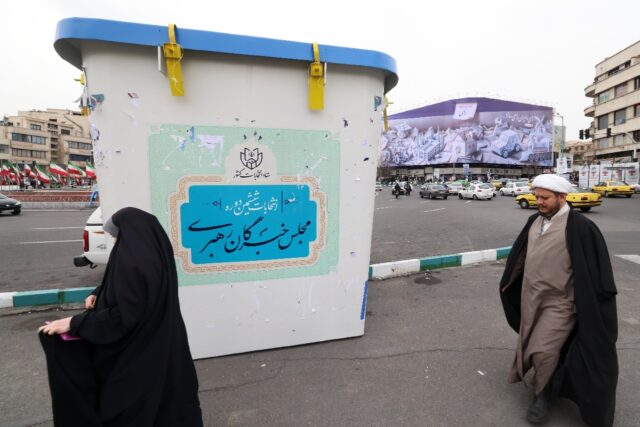
Iran’s conservatives and ultra-conservatives secured a large majority in parliamentary elections, officials said Monday, in a vote marked by a turnout of 41 percent, the lowest since the 1979 Islamic Revolution.
“Around 25 million people participated, with a turnout of 41 precent” in Friday’s elections, Interior Minister Ahmad Vahidi told a Tehran press conference.
Candidates categorised as conservative or ultra-conservative on pre-election lists won more than two-thirds of the seats, with around 15 percent of contests headed for a second round.
The vote, which also chose members of the key Assembly of Experts, was the first since nationwide protests broke out following the September 2022 death in custody of 22-year-old Mahsa Amini.
Amini, an Iranian Kurd, had been arrested for allegedly flouting the Islamic republic’s strict dress code for women.
The elections, in which a vetting process barred many hopefuls including moderates and reformists from running, took place as Iran suffers a severe economic crisis deepened by international sanctions.
Vahidi said the vote happened “despite the ill-wishers of the nation, including intelligence services and terrorist groups, trying very hard to undermine security”.
He also said that “in spite of the heavy and unprecedented propaganda of the enemies and the use of all tools to discourage and dissuade people from voting, and despite some economic problems, the people showed a magnificent presence”.
Iranian authorities, fearing low turnout, had attempted to rally voters, with supreme leader Ayatollah Ali Khamenei saying before the election that Iran’s “enemies want to see if the people are present”.
In contrast, a coalition of parties called the Reform Front had said it would not take part in “meaningless, non-competitive and ineffective elections”.
On Monday, Azar Mansouri, the head of the coalition, said she hoped “this election will be a lesson and the authorities in the country will find out before it is too late that the continuation of this path will cause irreparable damage to this country,” according to reformist newspaper Shargh.
45 seats for second round
Of the 290 seats in parliament, 45 will go to a second round of voting to be held in either April or May, including 16 of 30 seats in the capital Tehran, according to the spokesman for Iran’s elections authority Mohsen Eslami.
Over 200 out of 245 elected members are conservatives or ultra-conservatives, including the two who garnered the most votes in Tehran, Mahmoud Nabavian and Hamid Rasaee.
The current speaker of parliament, Mohammad Bagher Ghalibaf, also a conservative, came in fourth while 35-year-old TV host Amir Hossein Sabeti secured the third place.
Centrist candidate Mohammad Bagher Nobakht, who criticised conditions in Iran ahead of the election as “not favourable”, did not gain enough votes to secure a seat.
The parliamentary elections use a list system, with large multi-member constituencies. The highest ranked candidates, up to the number of seats available, are elected.
A candidate must get at least 20 percent of all valid votes in their constituency to be elected in the first round.
Across the country, 11 women garnered enough votes to enter parliament in the first round of the elections compared to 16 who currently sit in the unicameral legislature.
Eslami also said all the new members had been chosen for the 88-seat Assembly of Experts which is tasked with electing, supervising and, if necessary, dismissing the supreme leader, who has the final say in all matters of state in Iran.
Khamenei, now 84, has held the post since 1989.
The most high-profile absentee of the assembly election was moderate former president Hassan Rouhani who was barred from taking part after 24 years as a member.
Iran’s 2020 parliament was elected during the Covid pandemic with a turnout of 42.57 percent — at the time the lowest since 1979.
In the 2016 parliamentary elections, turnout was above 61 percent in the first round.
